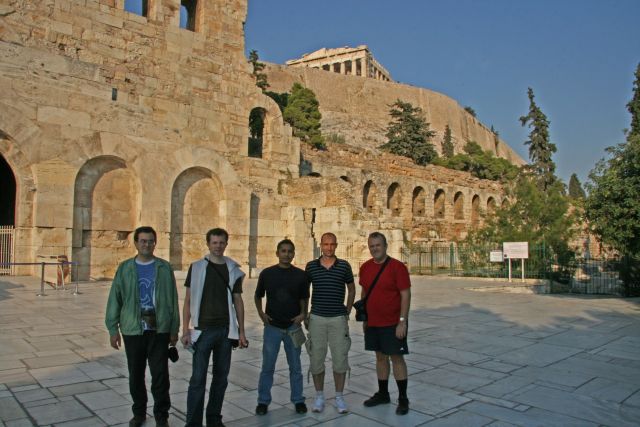QoEWeb
QoEWeb: Quality of Experience and User Behaviour Modelling for Web Traffic

QoEWeb Project Team
| Head | Tobias Hoßfeld, University of Würzburg |
| Markus Fiedler, Blekinge Institute of Technology | |
| Denis Collange, France Telecom SA | |
| Zbigniew Kotulski, Warsaw University of Technology | |
| Researchers | Daniel Schlosser |
| Valentin Burger | |
| Patrik Arlos | |
| Junaid Shaikh | |
| Frederic Guyard | |
| Frédérique Millo | |
| Wojciech Mazurczyk | |
| Tomasz Ciszkowski | |
Summary
Increasingly many ICT solutions, services and applications, use the web browser as well-known and well-understood user interface. Typically, such services work in an interactive manner, i.e. the user performs some action (clicks on some link or button, or enters some information) and needs to wait for the response. As long as the latter arrives within a certain time horizon, e.g. within the reaction time of one second, the user feels the system to react immediately. However, long or heavily varying response times upon user action make the user suffer. The question is now: How patient is a user in such a case, i.e. how does her/his perception sink with time and/or the number of actions performed in case of bad network conditions? This question needs to be related to the type of application, which means considering the expected performance for a fixed web page, a video, a request to a search engine, etc.
For ISPs, the main application is to detect performance problems (based on user perception) on their network. In case of trouble, they can apply tools to localize, diagnose and correct the problem. These tools build on network measurements (QoS), which need to be linked to user perception (QoE). Some dependencies between network-level performance (loss rate, throughput, etc.) and application-level performance (response time) criteria may be modelled by TCP models. For instance, a large packet loss rate, reflecting unreliable network conditions, leads to very variable response times. Some transfers are still quickly served, while others observe very long response times. So the users should observe varying response time which may be more disturbing than constant long response times. However, a more detailed (multi-factorial) statistical and time-dependent analysis of correlations between QoS and QoE is needed to detect other phenomena such as the decrease of user satisfaction until a point when the service in question is abandoned. Once this timely behaviour is known and modelled, it defines the time frame on which the provider needs to act in order to prevent the users from giving up.
Bad QoE can have serious consequences for an Internet Service, Application Service and Hosting Provider. A user that “cannot get its job done” might consider to “churn”, i.e. to abandon the provider/operator in question. Complaining users are the top of an iceberg, many just leave without further notice towards the operator. However, they might spread bad gossip about their negative experience. In other words, the reputation of the operator/provider (from the user point of view) will be affected in a negative way.
The aim of the proposed specific EuroNF project is to model user perceived quality and user behaviour for web traffic. To be more precise, our main objectives are:
Quantification of QoE for web traffic, based on passive measurements (observations) within an operator’s network and active measurements in a test laboratory - Description of an appropriate model for the (timely) behaviour of web user satisfaction / impatience which builds upon feedback of the user-perceived quality, based on the measurements
- Application of the derived user model to identify impact of QoE on system performance in business environments like wireless networks with shared capacity
- Quantification of reputation management applying the derived model in order to allow provider/operator to react before the user-related reputation gets critical
Phone Conferences
- September 18th, 2-3pm, preparation of Kick-off meeting in Athens
- November 12th, 9-10am, discussion of survey paper
- December 10th, 2-3pm, status survey paper and measurements
- January 23rd, 3:30-4:30pm, first draft ready
- February 6th, 10-12am, discussion on current draft
- March 13th, 10-11am, current status of reputation and IEEE survey paper, activities in WP1 and WP3
- March 30th, 2-3pm, mid-term report, IEEE survey paper
- April 29th, 2-3pm, active and passive measurements, simulation framework for shared system and first results
- June 19th, 10-11am, current status of WPs
- July 28th, 5:30pm-6:30pm, after the EuroView workshop, current status of WPs
Meetings
- Kick-Off meeting, October 15th, 2008, co-located with Euro-NF workshop on socio-economics in Athens
- Members of QoEWeb team will participate at the Dagstuhl Seminar From Quality of Service to Quality of Experience, May 5th - 8th, 2009
Talks
- Tobias Hoßfeld, An overview on the QoEWeb Project, 1st EuroNF Socio Economics Workshop, October 16th, 2008, Athens, Greece; slides available as ppt or pdf
- Tomasz Ciszkowski, Towards Quality of Experience-based Reputation Models for Future Web Service Provisioning, 2nd Euro-NF Workshop on Future Internet Architectures: New Trends in Service Architectures, Santander, Spain, June 9th, 2009
- Members of QoEWeb team participated at workshop on "Quality of Experience (QoE)", collocated with 21st International Teletraffic Congress (ITC 21) - Traffic and Performance Issues in Networks of the Future, 18th September 2009, Telecom ParisTech, Paris 13, France
- Sergio Beker and Frederic Guyard (FT): Towards a QoE Framework
- Markus Fiedler (BTH): QoE quantification and feedback
- Thomas Zinner, Tobias Hoßfeld (UWUERZ): Controlling QoE of Scalable Video Codecs for Future Video Streaming Systems
Other Stuff
restricted access to the shared web repository.
description of the project in the public Euro-NF knowledge map

-
A Generic Quantitative Relationship between Quality of Experience and Quality of Service. . In IEEE Network Special Issue on Improving QoE for Network Services. 2010.
-
Towards Quality of Experience-based Reputation Models for Future Web Service Provisioning. . In Special Issue of the Springer Telecommunication Systems Journal: Future Internet Services and Architectures - Trends and Visions, print available in 2013, 51, pp. 283–295. 2010.
-
Quality of Experience-Related Differential Equations and Provisioning-Delivery Hysteresis. . In to 21st ITC Specialist Seminar on Multimedia Applications - Traffic, Performance and QoE. Phoenix Seagaia Resort, Miyazaki, Japan, 2010.
-
Towards Quality of Experience-based Reputation Models for Future Web Service Provisioning. . In Future Internet Architectures: New Trends in Service Architectures (2nd Euro-NF Workshop). Santander, Spain, 2009.


